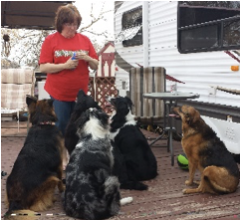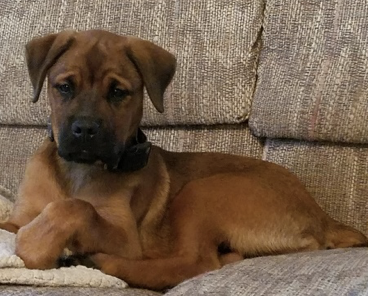by Kara Hollars, owner of Personal Family Dog Trainer.
The Problem
 You see a person working with their dog, using treats as a reward. The person shows the dog a treat, then asks them for a behavior. The dog complies 100% of the time, which looks very impressive! This goes on for some time. Suddenly, a look of panic crosses the persons face. They’ve run out of treats! They ask their dog for another behavior, the dog looks for the treat, then gets up and walks away. The owner follows, desperately trying to get the dog to listen. What went wrong?
You see a person working with their dog, using treats as a reward. The person shows the dog a treat, then asks them for a behavior. The dog complies 100% of the time, which looks very impressive! This goes on for some time. Suddenly, a look of panic crosses the persons face. They’ve run out of treats! They ask their dog for another behavior, the dog looks for the treat, then gets up and walks away. The owner follows, desperately trying to get the dog to listen. What went wrong?
What Happened
These types of dogs are what we call McBribers. They feel that they should get a treat for everything that they do, and if their owner does not have a treat they don’t need to listen. These stories are always sad ones to hear, mostly because they are so easy to prevent!
The good new is that no matter what stage your dog is at, you can work on this. The best news is that we have never worked with a dog who hasn’t improved their behavior significantly in a short period of time as long as the protocol was applied correctly!
How Do We Work On It?
 Most McBribers are created when an owner is taught how to begin training their dog, but not how to finish training. As dog trainers, when we talk about how to prevent McBribers we often begin by discussing how our parents used our allowances as children. All experiences are different, but when I was a toddler, my parents used to ask me if I’d like a quarter while showing me a bright, shiny quarter. Of course I would say yes every time, and they would tell me that if I picked up my clothes I’d get the quarter. Each time I picked up my clothes they would praise me for picking up the clothes, then they would give me the quarter.
Most McBribers are created when an owner is taught how to begin training their dog, but not how to finish training. As dog trainers, when we talk about how to prevent McBribers we often begin by discussing how our parents used our allowances as children. All experiences are different, but when I was a toddler, my parents used to ask me if I’d like a quarter while showing me a bright, shiny quarter. Of course I would say yes every time, and they would tell me that if I picked up my clothes I’d get the quarter. Each time I picked up my clothes they would praise me for picking up the clothes, then they would give me the quarter.
When I grew into a young child my parents began asking if I would pick up my clothes without showing me the quarter. Based on what I had learned previously, I knew I would receive praise and a quarter if I did what was asked of me, so of course I would complete the task without fuss. As an older child my parents upped the ante by asking me to do four tasks which, coincidently, meant that I would clean my entire room. I was a little leery, but since they were consistent with their praise and quarters up until this point, I decided that I trusted them and completed the four tasks. They praised me each time I finished a task, and at the end I got four quarters! My parents continued working with me in this manner until I became a teenager and was proficient at working through the week in order to get my allowance on the weekend.
By the time I began working at my first real job receiving a weekly paycheck made sense since I had already been doing something similar for the past few years. That job was also my favorite, because sometimes our boss would give us a bonus during the week! Not only was it a great pick-me-up on that day, but it made me excited to come into work every day!
The Breakdown
 Now, let us take that scenario and translate it into canine training. In the scenario above, we read about a few points in the life of a Toddler, Young Child, Older Child, and Teenager. Just as my parents continued working with me until I understood the world around me, we continue working with our dogs until they understand their world and how they must behave in it! However, since we cannot train children and dogs in the same manner, we adapt the parenting methods mentioned above into something that we can use for the dogs we train.
Now, let us take that scenario and translate it into canine training. In the scenario above, we read about a few points in the life of a Toddler, Young Child, Older Child, and Teenager. Just as my parents continued working with me until I understood the world around me, we continue working with our dogs until they understand their world and how they must behave in it! However, since we cannot train children and dogs in the same manner, we adapt the parenting methods mentioned above into something that we can use for the dogs we train.
Canine Training Timeline
 100% Guarantee – Toddler Training – The first thing your dog needs to learn is that you are the giver of good things! This can happen in a variety of ways, but the most common are hand feeding your dog or working on the behavior “Touch”. In any case, in this step the dog is asked for a behavior, shown the reward, then receives praise and the reward for completing the behavior. This is a great beginning, but it doesn’t stop here!
100% Guarantee – Toddler Training – The first thing your dog needs to learn is that you are the giver of good things! This can happen in a variety of ways, but the most common are hand feeding your dog or working on the behavior “Touch”. In any case, in this step the dog is asked for a behavior, shown the reward, then receives praise and the reward for completing the behavior. This is a great beginning, but it doesn’t stop here!
 Trust Gambit – Young Child – The second step in this process is to teach your dog to trust you. Begin by placing the rewards in a bowl next to you, in a pocket, or even in your closed hand. Ask your dog for a behavior, such as a Sit or a Down. When they complete the behavior, they are praised and rewarded. (At this point your dog is still being rewarded 100% of the time for the correct behavior, they just no longer see the reward before offering the correct behavior.)
Trust Gambit – Young Child – The second step in this process is to teach your dog to trust you. Begin by placing the rewards in a bowl next to you, in a pocket, or even in your closed hand. Ask your dog for a behavior, such as a Sit or a Down. When they complete the behavior, they are praised and rewarded. (At this point your dog is still being rewarded 100% of the time for the correct behavior, they just no longer see the reward before offering the correct behavior.)
 Introducing Roulette – Older Child – Now we work on expanding the limits of your dog’s trust by asking your canine for multiple behaviors, then giving higher rewards. For instance, you may ask your dog to Sit, Down, and Spin in a circle. If they complete those three behaviors, they get 3 rewards. The next time you may ask for four behaviors before you reward them. After that you may ask for one behavior and reward that one behavior. If you continue playing this game with them, you’ll end up with a dog that will always perform the behavior, because they know that sooner or later they’ll get a reward for it!
Introducing Roulette – Older Child – Now we work on expanding the limits of your dog’s trust by asking your canine for multiple behaviors, then giving higher rewards. For instance, you may ask your dog to Sit, Down, and Spin in a circle. If they complete those three behaviors, they get 3 rewards. The next time you may ask for four behaviors before you reward them. After that you may ask for one behavior and reward that one behavior. If you continue playing this game with them, you’ll end up with a dog that will always perform the behavior, because they know that sooner or later they’ll get a reward for it!
 Roulette For Life – Teenager And Beyond – The last step in this process is to play Roulette without having a reward near you at all. For instance, you may ask your dog to Sit, Down, and then Stand in the living room, when the rewards are in the kitchen. After your dog has successfully completed Sit, Down, and Stand, you both walk into the kitchen and your dog receives their reward. This shows your dog that even though you don’t smell like (or look like) you have a reward, it doesn’t mean that they won’t get rewarded.
Roulette For Life – Teenager And Beyond – The last step in this process is to play Roulette without having a reward near you at all. For instance, you may ask your dog to Sit, Down, and then Stand in the living room, when the rewards are in the kitchen. After your dog has successfully completed Sit, Down, and Stand, you both walk into the kitchen and your dog receives their reward. This shows your dog that even though you don’t smell like (or look like) you have a reward, it doesn’t mean that they won’t get rewarded.
 Jackpot! – Bonus – In addition to playing Roulette For Life, you can spoil your dog occasionally with a Jackpot. A Jackpot is when you give more rewards than normal for the behavior(s) offered. This is a great way to reward your dog for a job well done!
Jackpot! – Bonus – In addition to playing Roulette For Life, you can spoil your dog occasionally with a Jackpot. A Jackpot is when you give more rewards than normal for the behavior(s) offered. This is a great way to reward your dog for a job well done!
Words, Wisdom, And Wisecracks
– Have Fun! Nobody enjoys working with a sourpuss.
 – Don’t get discouraged!
– Don’t get discouraged!
– There is no such thing as a perfect dog, but you can work towards having a dog who will be a perfect fit for you.
– Nothing in life is free – Dogs should not receive a reward without working for it, and they should not work without receiving a reward.
– Each dog is uniquely made and has a purpose. As their owners we have the pain and the pleasure of helping them discover what that purpose is. 😊
==
Author bio:
 Kara Hollars is the Owner and Lead Trainer of Personal Family Dog Trainer, a professional canine training business that works with clients and canines throughout the Midwest. Kara comes from a family of dog lovers and has worked with rescues for as long as she can remember. She began formally training in 2008 and opened Personal Family Dog Trainer in the fall of 2011.
Kara Hollars is the Owner and Lead Trainer of Personal Family Dog Trainer, a professional canine training business that works with clients and canines throughout the Midwest. Kara comes from a family of dog lovers and has worked with rescues for as long as she can remember. She began formally training in 2008 and opened Personal Family Dog Trainer in the fall of 2011.
The decision to begin training professionally came when she began seeing holes in the training programs in her area. She realized that most trainers in her area were treating symptoms instead of fixing problems. Kara began developing a whole-life canine instruction program, which starts with The Ultimate Puppy, then moves onward through Companion Dog and Family Dog programs. For those with specialized goals, she incorporated a Therapy Dog Program, Behavior Adjustment Programs, and a tri-level Trick Course.
In addition to teaching others, she also is a believer in continuing education herself. She enjoys communicating with others in her field, is a member of the International Association of Canine Professionals (IACP), and a Canine Good Citizenship (CGC) Evaluator for the AKC.
When she is not training, she is volunteering in the community. She and her Therapy Dogs can often be found at local hospitals, nursing homes, and schools. In her free time, she enjoys gardening, spending time with her family, or sitting down with a good book.

Did you find this article useful? Would you like 100% free access to more articles like these, and free access to over 5,000 vetted pet care service professionals throughout the United States? Sign up here for a free Petworks account. It’ll take you literally 30 seconds!


